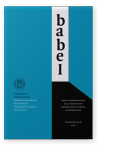Vol. 63:6 (2017) ► pp.786–812
Typology of title transformations in self-translations of Vladimir Nabokov’s short stories
This article is dedicated to the issue of the adequacy of self-translations of Vladimir Nabokov’s small forms of fiction. Different types of transformations of short-story titles in the creative work of the bilingual writer were chosen as the object of the research. The article is characterized by a multidisciplinary approach, uniting aspects of linguistic, literary and cultural studies in the investigation of the self-translation phenomenon, an approach that provides for scientifically-grounded conclusions. The authors of the paper build a typology of structural and semantic changes reflecting the features of Nabokov’s interpretations of his own texts. Contrastive comparative, structural, intertextual and cognitive methods were employed as the main research methods. This complex approach to text analysis used in the paper permits an expansion of the idea of the semantics and poetics of separate texts as well as a collection of stories as a whole. The authors pay special attention to investigation of the following types of correlation between the original title and its equivalent: semantic specification, semantic narrowing, semantic broadening and modulation. The authors note that Nabokov in many cases does not follow his own principles of “literality”. The specializing character of correlation between the original text and the translation is predetermined by the author’s aspiration to convey the exact sense and to emphasize separate connotative shades of meaning, while devices of modulation and semantic broadening perform the function of an author’s comment.
Article outline
- 1.Introduction
- 2.Types of title transformations
- 2.1On self-translations of Nabokov’s small forms of fiction
- 2.2Semantic narrowing (specialization)
- 2.3Particularizing specification
- 2.4Compensation device
- 2.5Semantic broadening technique and creating a wordplay
- 2.6The broadening of meanings and metaphorization of the title
- 2.7Modulation or semantic development
- 2.8Semantic reduction
- 2.9Contextually-antonymic translation
- 2.10Untranslated stories
- 3.Data analysis
- 4.Conсlusion
- 5.Further thoughts
-
References
